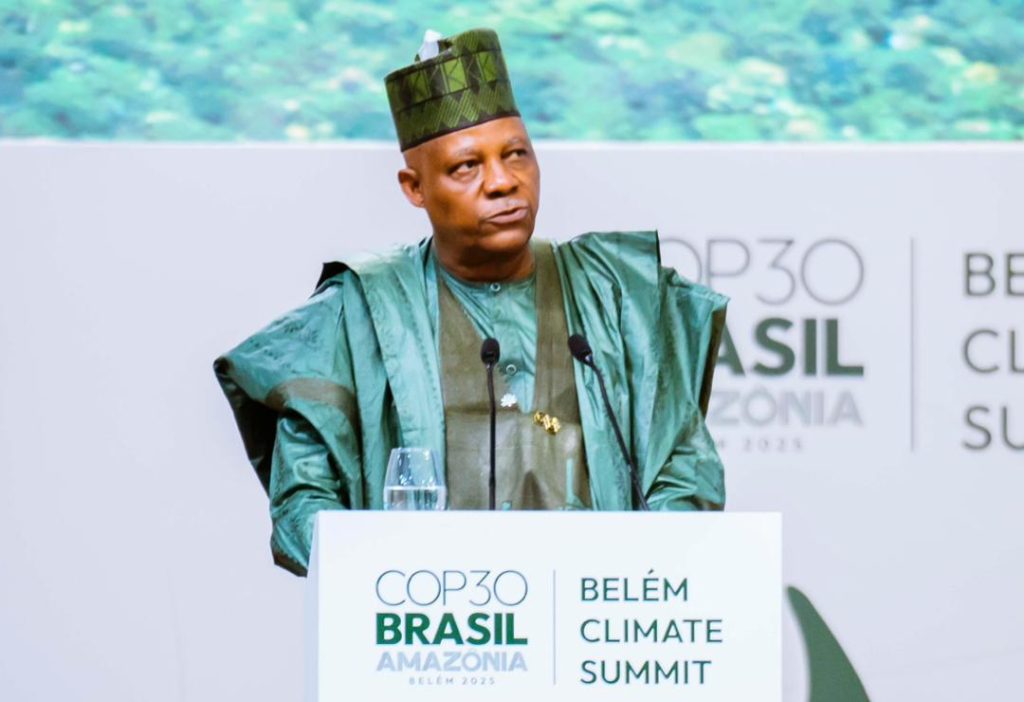
Nigeria has called on world leaders to significantly scale up global financing for the protection and restoration of nature, warning that without urgent and equitable funding mechanisms, the planet’s most vital ecosystems will continue to deteriorate at devastating human and economic costs.
Vice President Kashim Shettima, representing President Bola Ahmed Tinubu at the ongoing United Nations Climate Change Conference (COP30) in Belém, Brazil, made the call on Thursday during a high-level thematic session titled “Climate and Nature: Forests and Oceans.”
Shettima, who reaffirmed Nigeria’s leading role in Africa’s green transition efforts, said the country is integrating nature-positive investments into its climate finance system, targeting up to $3 billion annually to drive reforestation, blue carbon, and sustainable agriculture projects.
“Through our National Carbon Market Framework and Climate Change Fund, we aim to mobilise up to three billion US dollars annually in climate finance. These resources will be reinvested in community-led reforestation, blue carbon projects, and sustainable agriculture,” he said.
According to a statement by Senior Special Assistant to the President on Media and Communications, Office of the Vice President, Stanley Nkwocha, Shettima urged developed nations to match rhetoric with action by delivering predictable, equitable, and accessible financing that reflects the economic value of nature.
The Vice President lamented that while countries in the Global South have contributed the least to global warming, they continue to bear its harshest consequences.
“Those who have benefited the most from centuries of extraction must now lead in restoration,” Shettima stated, stressing that true climate justice requires developed economies to champion grant-based financing, operationalise blue carbon markets under Article 6 of the Paris Agreement, and support debt-for-nature swaps that allow developing nations to invest in conservation.
He further called on the global community to empower indigenous peoples, farmers, and fisherfolk who safeguard ecosystems, ensuring that they are “rewarded for their stewardship rather than displaced by it.”
Highlighting Nigeria’s ongoing initiatives, Shettima said the government is “taking bold, coordinated steps to restore balance between climate, nature, and development.”
He listed the implementation of the Great Green Wall Initiative, which is re-foresting degraded lands across eleven frontline states, planting over 10 million trees, and creating thousands of green jobs for youth and women.
Additionally, under Nigeria’s National Afforestation Programme and Forest Landscape Restoration Plan, the country aims to restore over two million hectares of degraded land by 2030.
Shettima also noted the recent launch of Nigeria’s Marine and Blue Economy Policy, designed to harness the potential of the nation’s seas sustainably through climate-smart fisheries, coastal protection, and marine biodiversity conservation.
“Our National Council on Climate Change provides the institutional backbone for integrating climate action into all sectors of governance. We are working to ensure that climate action becomes synonymous with nature restoration and human prosperity”, he said.
Rejecting what he termed “an outdated narrative of Africa as a mere victim of climate change,” the Vice President emphasised that the continent remains a critical part of the global solution.
“Africa’s rainforests, mangroves, peatlands, and oceans are among the planet’s largest untapped carbon sinks, while our young population is the world’s greatest untapped source of innovation and resolve,” Shettima asserted.
He declared that COP30 must mark the beginning of a new global compact that recognises Africa’s ecosystems as assets deserving of global investment and protection.
“We invite all partners to join Nigeria and the African Union in advancing the African Nature Finance Framework, designed to unlock private capital for reforestation, ecosystem restoration, and blue economy development across the continent,” he said.
Shettima warned that countries that neglect their forests and oceans often pay a steep price through ecological instability and conflict.
He cited deforestation, desertification, illegal mining, and coastal erosion as urgent threats within Nigeria, with the Sahara advancing nearly one kilometre annually, displacing communities and eroding livelihoods.
“Each piece of land these threats overcome invites conflict into human lives, compounding our development challenges,” he cautioned.
Reaffirming Nigeria’s commitment to global collaboration, Shettima said the nation will continue to “sit in the front row” of any international effort aimed at restoring the planet’s ecological balance.
“Nigeria believes that COP30 must go beyond pledges — it must represent a turning point where climate action becomes a shared duty to protect nature and secure prosperity for all,” he said.



